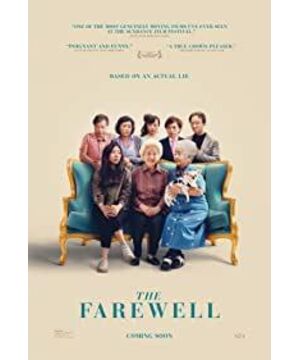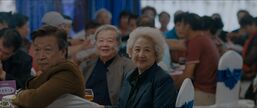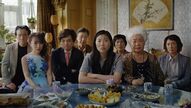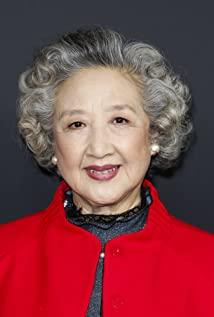"Film, as a narrative body, its cultural identity is often a general psychological tendency expressed in a non-mandatory form." [Jia Leilei: "Film, as a Cultural Expression of Nationality", "Nationality" Art Studies, January 2017, p. 72. ] In the context of globalization, individual cultural backgrounds and cultural identities are becoming more and more diverse and complex, so there is often an identity confusion caused by conflicts and collisions between cultural differences. "Don't Tell Her" (the farewell), released in 2019, clearly reflects this phenomenon. The Chinese director Wang Ziyi created this all-Chinese cast based on his own personal experience, reflecting the Sino-American cultural conflict in the new era. family comedy. From the perspective of the unique "dual cultural identity" of the Chinese identity, the film conducts a careful observation of Chinese culture, and completes a self-recognition and identification in the resonance of family affection and love. After the film was released in the United States, it not only aroused the collective emotional resonance of overseas Chinese, but also allowed Eastern and Western audiences to experience a common review and understanding of self and other cultures.
1. The Chinese Perspective: A Sober Perspective Between Two Cultures
For a long time, Chinese images and Chinese images have been highly stereotyped and one-sided in American films. As important participants in American history and social development, Chinese people have not been fully and truly presented in modern American mass media. In 1993, the film "The Joy Luck Club" directed by Chinese American director Wang Ying was released in North America. It can be regarded as the first time that the works of Chinese American directors have entered the field of vision of the American film industry. It has not only become an important part of Western mainstream culture, but also has become a Western audience. A polygonal prism to know and understand Chinese culture and image. In 2018, although "Crazy Rich Asians" won the top box office in the United States, it attracted a large number of Western audiences with the spectacle of Chinese culture and the Asian-American group's ostentation of wealth.
Some scholars have divided and summarized Chinese American directors as follows: "Wang Ying and Zeng Yitian, as the first generation of contemporary Chinese directors, explored the mental journey of Chinese immigrants in American society with their politically charged film creation; as the second generation of Chinese directors. Ang Lee writes about the continuous tearing and grinding of traditional Chinese culture in American society with his film creations with deep oriental cultural connotations; while the 'new generation' Chinese American directors focus on the younger generation of Chinese immigrants with a wide variety of film creations. The realistic existence and 'cultural identity' of Chinese American society not only expresses their critical identification with American society, but also expresses their exploration, questioning and expectation of Chinese culture." [Cui Jun: "New Generation" Chinese American Directors' Film Studies", vol. Journal of Beijing Film Academy, June 2014, pp. 44-45. ] In this sense, Wang Ziyi and her work "Don't Tell Her" undoubtedly fit the temperament of the new generation of Chinese directors. The film tells the story of a grandmother in a large Chinese family who was diagnosed with advanced lung cancer. The whole family concealed her condition from her, and used the grandson Haohao, who immigrated to Japan, to return to the country to hold a wedding, so that the "separated" family could be reunited. I went there to visit and accompany my grandma, and to usher in the farewell that I don't know when it will come. The film begins with the daily conversation between Billy, a granddaughter who grew up in the United States, and her grandmother in China. In this way, through the setting of the twin cities of New York and Changchun, the life and value choices of people in the two cities separated by ocean are linked. The fact that "should" and "shouldn't" tell my grandma to be sick reveals the conflict between Eastern and Western cultures and values. The meaning of "revealing" here lies in the decoding process of the film by the audience, not in the director's deliberate coding process. The director's own explanation for the work is, "What this movie wants to show is the way everyone sees things, should I tell my grandma? Everyone sees things differently, and this difference in details sometimes Big and sometimes small, maybe because of culture, maybe just because of individuals, there is no right or wrong, I just want to show the event itself." [E.Alex Jung. Lulu Wang Spots the Lie The Director of the Sundance sensation the farewellThe Farewell has made the kind of movie Hollywood never makes [EB/OL]. [2019-12-25]] It can be seen that if the meaning of the film is only understood as the display of cultural differences or the self-consciousness of cultural identity, it may deviate from the original intention of the director. What she hopes to express is a "purity of the experience that is taking place and the emotion that is being produced". [ Ibid. ]
The film focuses on what Bili has seen and heard in China, and uses this strange vision belonging to the "other" to examine the Chinese scene. As soon as Billy came out of the airport, she presented a group of black car drivers from her perspective, causing a sense of oppression from a strange world. Then there is the typical Chinese third- and fourth-tier urban landscape that Bili sees from the taxi. Next, the old community of grandma's house, the daily scenes of cooking and pancakes at home, grandma's Chinese-style morning exercise, and the waiter saying "beautiful women". ”, the process of the massage parlor, the process of going to the grave, the wedding program, etc., all have new meanings in this somewhat biased observation. However, this kind of spectacle for unfamiliar eyes is not out of deliberately creating an exotic atmosphere, but first and foremost as a natural expression of puzzling and confusion. The film is adapted from the director's personal experience of the family story. There is a direct correspondence between the director himself and the role of Bili. Therefore, the various scenes shown in the film are the result of the creator's observation of the "movie eyes" that go deep into the Chinese scene, as cultural differences. The objective presentation of materials is a frank confession of one's own life experience, and a natural emotional expression of curiosity and confusion. The attitude presented in the film is like Billy's answer to a hotel waiter's question about "China is better or America is better": "It's not the same, they're just different."
The complexity of Chinese identities makes them more diverse. Just like Bi Li in the film, words like China, grandpa, and grandma are associated with a carefree childhood and a rare and beautiful experience in life. Therefore, they will never forget their "mother country". "Identity, and had to live in a relatively more familiar "exotic" reality. Thus, group identity and individual identity, "the two ways of identity and the psychology of identity, are clearly reflected in the works of 'new generation' Chinese American directors: the United States and China are two indispensable cultural paradigms in their lives. and place them in their daily lives.” [Cui Jun: “Research on the Films of “New Generation” Chinese American Directors,” Journal of Beijing Film Academy, June 2014, p. 46. ] At the same time, because they have both national emotions and cultural vision, they also make them look at any kind of culture with a slightly alienated and calm vision, which also adds a real and objective color to the film.
2. Chinese Culture: Surface Appearance and Deep Logic
In addition to the superficial appearance of the Chinese scene, the film resonates with many Chinese people more because it shows the cultural logic behind the cultural surface. The English name of the film, the farewell, is literally translated as "farewell", but when choosing the Chinese title, the director chose "don't tell her", which is more subtle and vague, which can reflect the director's awareness of the difference between Eastern and Western cultures. For Chinese people, whether they should be told that their lifespan is running out is not as simple as a person’s right to know. Just like the entanglement and confusion of Billy in the film, the uncle who immigrated to Japan serves as the middle ground between Chinese and American cultures. Xiang, the answer: "There are some things you have to understand. You have gone to Western countries very early, because you see life as an individual, which is the cultural difference between the West and the East. Easterners see life as an individual. It is collective, family, society. You want to tell grandma the truth because you are afraid of taking responsibility... The reason why we do not tell grandma the truth is to share her ideological pressure." This is more about separation from relatives and actions. The lack of a member of a complete family and the happiness of not knowing the truth before death are such serious issues. The so-called "collective" here is no longer a concept related to the history of socialist revolution, but only refers to the collective as a family and sharing responsibilities. The concept of China is not an ideological level, but a cultural level that presents differences. of.
For China, the dining table is not only an important part of the life scene, but also an important display of culture. These have been seen in Ang Lee's films such as "Eating Men and Women" and "The Wedding Banquet". Similarly, Wang Ziyi also presented several important dinner table scenes in "Don't Tell Her". The typical Chinese-style round table has also become the best carrier of Chinese people's relationships and emotions. The first dinner table scene was when Bili suddenly returned to her grandmother's house. The whole family sat around the dining table with their own thoughts. Only the grandma, who was kept in the dark, simply thought that the upcoming wedding had contributed to the family's heavy burden. Gather, warmly invite everyone. In addition to Billie's uncontrollable sad expression, the director's camera language also shows that this reunion is not as happy as it seems on the surface. The round table book symbolizes reunion and wholeness, but the director deliberately did not use a panorama that included everyone, but divided the shots so that whoever speaks and shoots, the characters do not appear clearly in the foreground, but are placed in the foreground. In the background, there is always a blurred background with blurred figures in the foreground relative to the speaker's position. The sense of alienation from the split shots and the oppression of the foreground blocking are the real emotional expressions of the family suppressed behind the appearance of reunion. The second dinner table scene is similar to the first scene in overall expression, but it highlights the grandmother's status and responsibility as the head of the family, worrying about the children and grandchildren but enjoying it. In the third dinner table scene, the location is set in a restaurant, and the aunt's family is also added to the characters. It is different from the life atmosphere presented by the dinner in the previous two family scenes. In this scene, there is a "you come to me" scene between the aunt and the mother. The "cultural game" of the past shows some utilitarian and secular tendencies. My aunt felt that China was easy to make money, and gold was born everywhere, but she also wanted to send her son to study in the United States. Her mother kept asking questions about her contradictions. The struggle between materiality and value. And Bi Li's attitude is still the same as her previous attitude towards "is China better or the US is better", she is neutral, she believes that "money is not everything, money can't buy a lot of things". For the elders' debate, Bili seems confused and helpless. What is shown here is not the cultural difference under different cultural backgrounds, but the concept and value difference between generations. It is different from the grandmother’s adherence to and belief in traditional Chinese culture and behavior, and it is also different from the neutral and tolerant attitude of young people like Bi Li towards culture, who are accustomed to seeking value from outside. The consensus of the aunt's generation. At the beginning of the film, the parents were reluctant to let Billie know that her grandmother was seriously ill, because in their imagination, Billie was so "Western". Fang", will not accept the fact of not telling grandma the truth, there is no need to be entangled in the blood of China, the reason why they ignore Bili's feelings and misjudge the strength of her willingness to return to China, "is because the film is more Core Levels of Representation—Different perceptions of 'China and America/China to America' between two generations of immigrants. "[Wang Xin: "Don't Tell Her": China as Childhood, Difference and Inheritance, "The Art of Cinema", No. 3, 2020, p. 69.] The fourth dinner table scene is the climax of the film: the wedding Part. This is a typical Chinese wedding, with noisy guests, sumptuous dishes, and exaggerated performances. Under the catalysis of the warm atmosphere and the intertwining of Gongchou, the family members ushered in an emotional burst. The uncle cried bitterly during his speech, and the groom Hao Hao also burst into tears, and in the eyes of the grandmother and the unsuspecting guests, she cried with joy, but the family and the audience knew that this was a farewell ceremony wrapped in a wedding banquet.
3. Emotional connection: resonate with family affection and love
From the beginning of the film, Billy and her grandmother made a cross-country phone call to Billy crying and recalling the good times she spent at her grandmother's house, showing the deep emotional connection between Billy and her grandmother everywhere. The communication between Bi Li and her mother is often manifested as positive and negative shots. There are often disputes between mother and daughter, lack of communication, and inability to understand each other. There is a gap between the two. The communication between Billy and her grandmother is often in the same frame and intimate. Grandma sincerely thinks that Billy is "quite strong, independent, not the kind of person who follows the crowd", and also earnestly persuaded her to find someone "who can take care of her." Your person", but in the face of Bi Li's rhetorical question, "Does Grandpa Li take care of you?", Grandma immediately changed her words, "It's okay for a girl to be independent." Grandma has her own traditional values, but she also accepts and respects Bi Li's behavior. Young people have their own ideas and pursuits. Before Bili returned to the United States, she told her grandmother her reluctance and also told her that she did not get a scholarship. Grandma comforted her warmly and encouraged her to pursue her own life bravely. Grandma's warm and open-minded attitude has become the emotional support and booster for the always independent Billy. The estrangement between mother and daughter, the real crisis and sadness are all eased under the tolerance of grandma.
The film revolves around what Billy has always been confused and tangled about, which is whether she should tell her grandmother the truth about her illness. But in fact, "don't tell her" is not just for grandma, but for each other between grandma and her family. At the beginning, when grandma and Bili called, they were actually checking in the hospital, but lied to Bili that she was at her aunt's house; before eating, the uncle handed over the medicine, but told Bili that it was just vitamins, and she tried to suppress it all the time. It's a natural "don't tell them" out of fear of the family being worried, and it's also a common white lie in China. When Bi Li was in it, she naturally felt the human feelings behind this "concealment", and her entanglement and confusion were gradually resolved. After the wedding, Billie heard that her grandmother asked the nanny to get the inspection report. She was the first to rush to the hospital to stop the report, and revised the report with the help of her aunt and others. In the slow motion of the family walking forward with the report sheet, Billie is in the front and the middle. She has changed from the person who can't accept hiding the truth to the main person in this decision-making. The family members consciously and tacitly assumed psychological responsibility for each other, and the continuation of grandma's sense of happiness and existence when she didn't know the truth were the biggest reasons that touched Billy to complete this recognition. Rather than calling it a cultural identity, it's better to say that Billie's presence in it has a strong resonance with the universal emotion of family and love.
View more about The Farewell reviews











